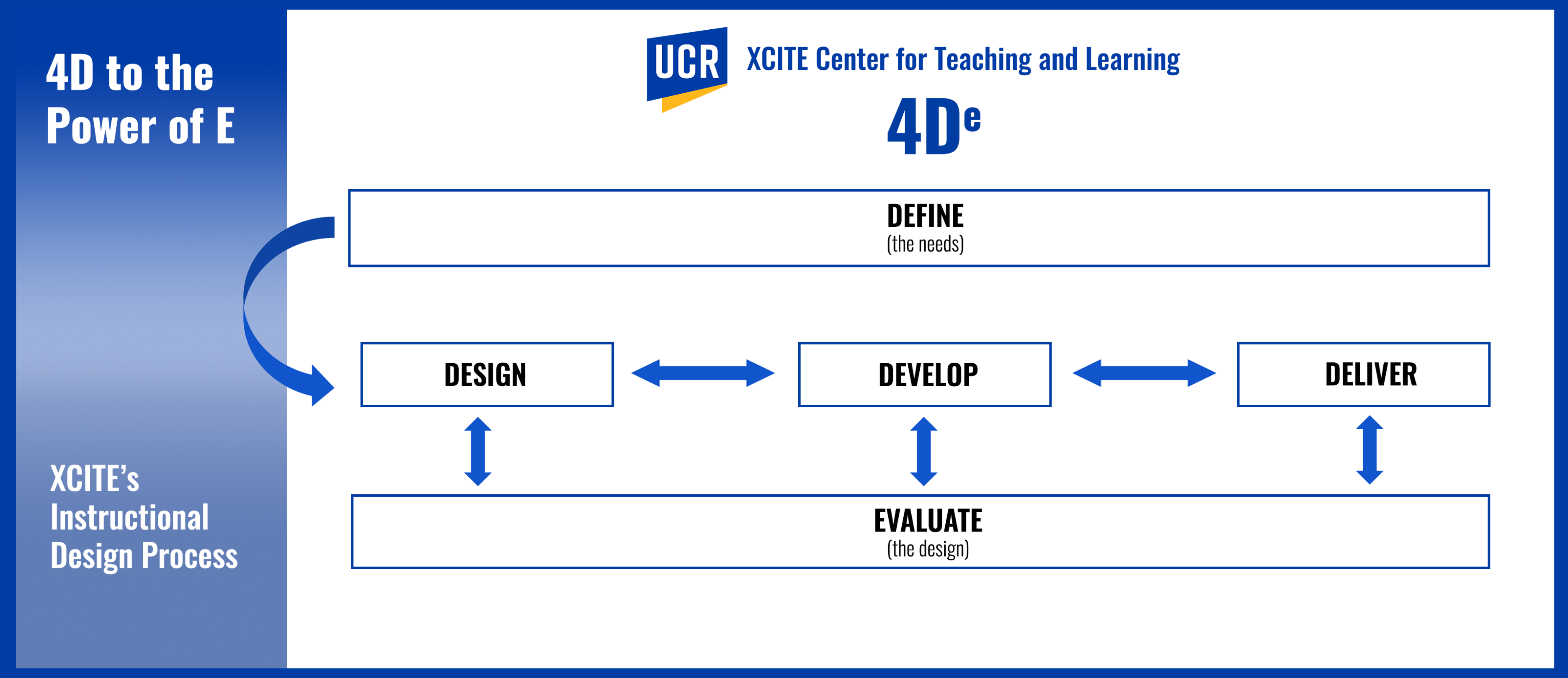Instructional design involves the application of a design framework to ensure that all aspects of a course (or course component) support student achievement of learning outcomes, and ultimately, course goals. Instructional designers work with instructors to implement learner-centered, evidence-based strategies that constructively align course content, activities, assessments, and tools to stated learning outcomes while engaging the student's curiosity.
XCITE has integrated UCR faculty experiences with the most commonly used evidence-based instructional design models (e.g., Backwards Design, Iterative Design, Spiral Design, ARCs Motivation, ADDIE, and SAM) and developed XCITE's 4De Instructional Design model below.
To set up a meeting with a member of our Instructional Design Team email xcite-help@ucr.edu.
Process Questions
-
Define
Key Questions:
- About your course
- What modality is this course currently taught in?
- What is currently working well in your course?
- What are your current challenges?
- When will your course be taught?
- How many students are in your course?
- What is your teaching style?
- What is your teaching philosophy?
- What pedagogy strategies are you using already?
- Are there ways you support inclusivity in your courses?
- What technology tools are you comfortable with?
- What is your vision for the course?
- How do you see XCITEs partnership with you supporting your course vision?
- What is your availability to work on your course design?
- About your course
-
Design
Key Questions:
- What are your departmental program objectives?
- What are your course objectives?
- What are your student learning outcomes (LO) for each module?
- What do you want your students to remember 5 years after taking this course?
- How will you assess whether students have met the learning outcomes?
- How often will you assess?
- What activities will enable students to meet the learning outcomes?
- Do your learning objectives align with the course learning activities and assessments?
- What support do you anticipate your students' needs?
- How might you design for inclusion & a sense of belonging for students?
-
Develop
Key Questions:
- What content currently exists?
- What content needs revising? How frequently does content need to be updated?
- What content needs to be created and in what formats?
- What resources do you have to assist with development (e.g., TA, departmental technologies)?
- What hands-on technology training might you need?
- If this course is online, have you received course approval from your Dean and the Committee on Courses?
- Have you completed student user testing and feedback for your course? Is your course student-ready?
- What content currently exists?
-
Deliver
Key Questions:
- How will you begin initial communication with your students?
- What technology and/or skills are required for participation?
- What is your level of confidence (1 low/5 good to go) in deploying the course? Do you need additional support?]
- What additional support do your students need?
- Do you need to revise your approach in response to unanticipated issues?
-
Evaluate
Key Questions:
- Did the course design and delivery meet the intended goals? (Do the learning outcomes meet the course objectives? Do the course objectives meet the program outcomes?)
- Do the activities and assessments sufficiently support students in achieving the indicated learning outcomes?
- How well do the students meet the learning outcomes throughout?
- Is there a sense of belonging in the course? Is the course equitable?
- What do the results of ongoing formative assessments and feedback tell you about your students’ learning needs and experiences? About your own personal, professional, or support needs?
- Do students know where to get various forms of support?
Quality Matters at UCR
UCR is now subscribed to Quality Matters (QM), an organization out of the University of Maryland that oversees a widely-adopted and recognized quality-assurance framework and community of practice for designing online and blended courses, improving existing online courses, or making specific improvements to courses centering around issues like alignment, measurable objectives or competencies, or welcoming students.
Quality Matters offers a number of face-to-face, online, and web conferencing workshops to help you use QM tools to improve courses. Quality Matters tools and resources can also be used to enhance fully in-person, or face-to-face courses. As part of our membership benefits, you can sign up to create a MyQM account that can be used to register for professional development opportunities through Quality Matters, such as the free, self-paced course “Elements of Quality Matters,” a good place to start!
Here is a link to some instructions for how to set up your Quality Matters account. Please sign up using your NetID@ucr.edu email address.
A MyQM account will subscribe you to the Quality Matters newsletter, and will provide you access the Quality Matters Course Review Management System, a tool that facilitates free, self-review of courses according to the 7th edition of the Quality Matters Higher Education Rubric (PDF ⤓) , a framework for course quality recently updated in July 2023.
Please refer to the handout called “Getting Started with Quality Matters” for helpful links, and send any questions to UCR’s Quality Matters Coordinators, Samantha Eastman: samantha@ucr.edu and Debbie Nelson: dnels009@ucr.edu.

